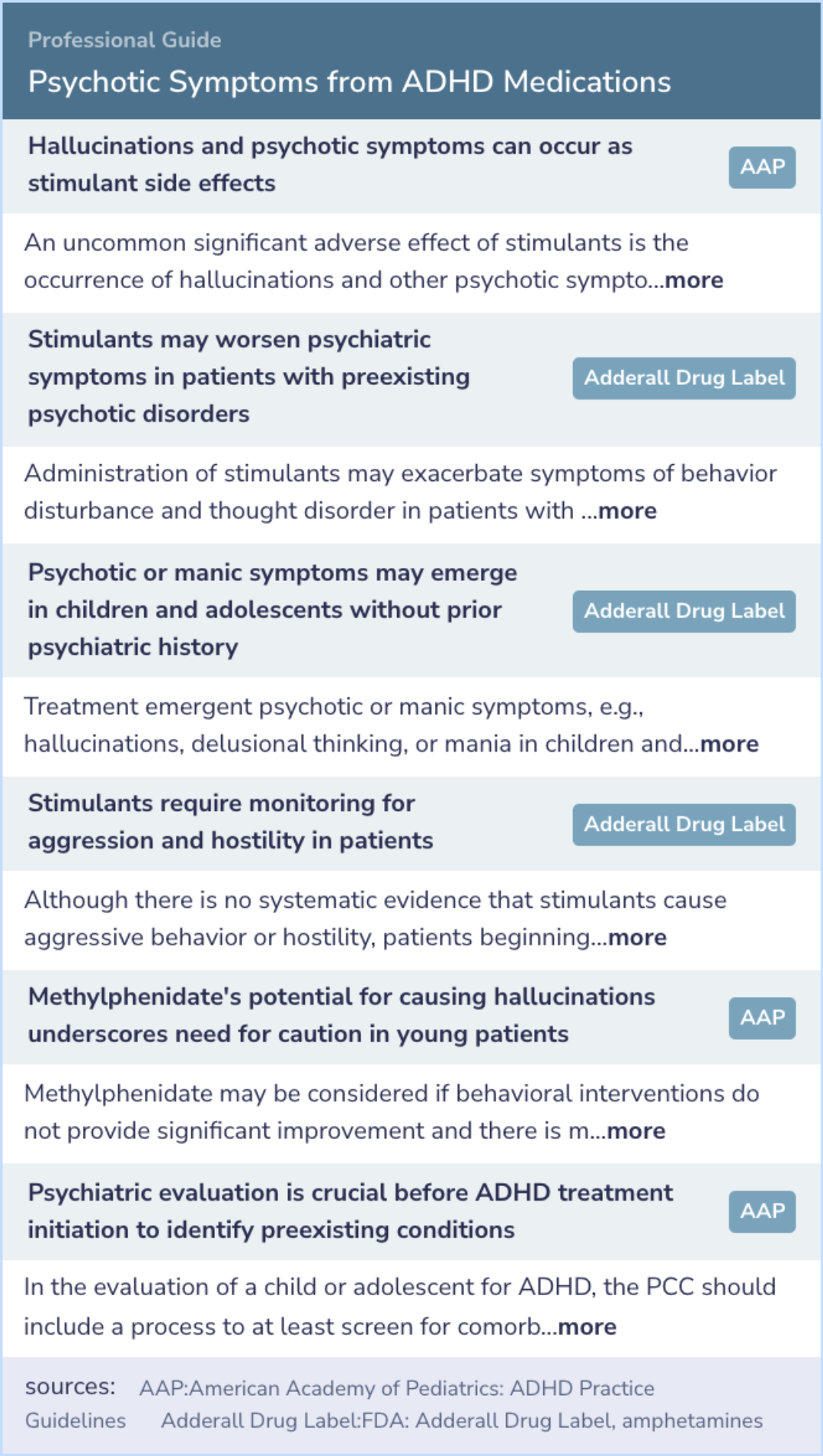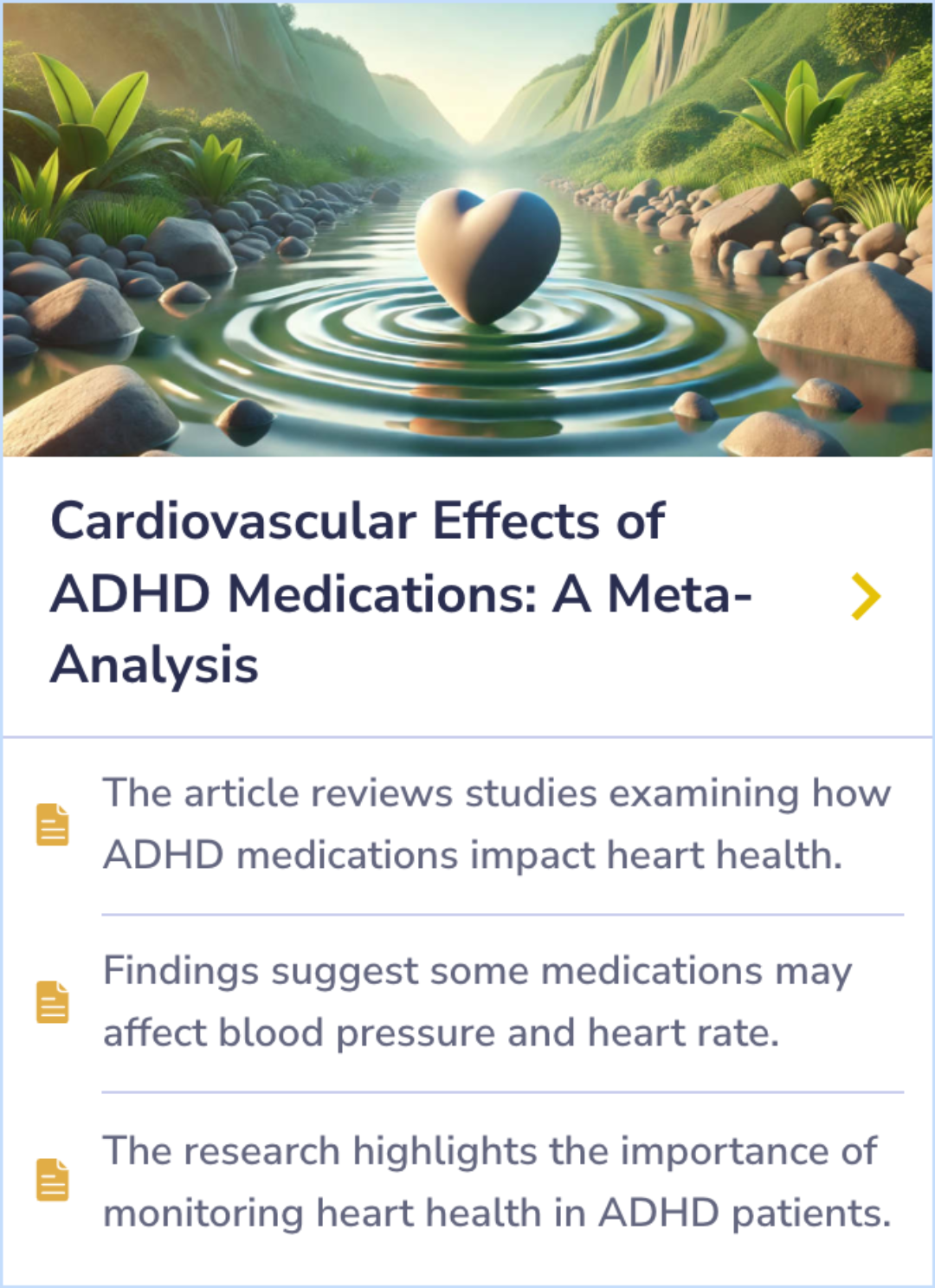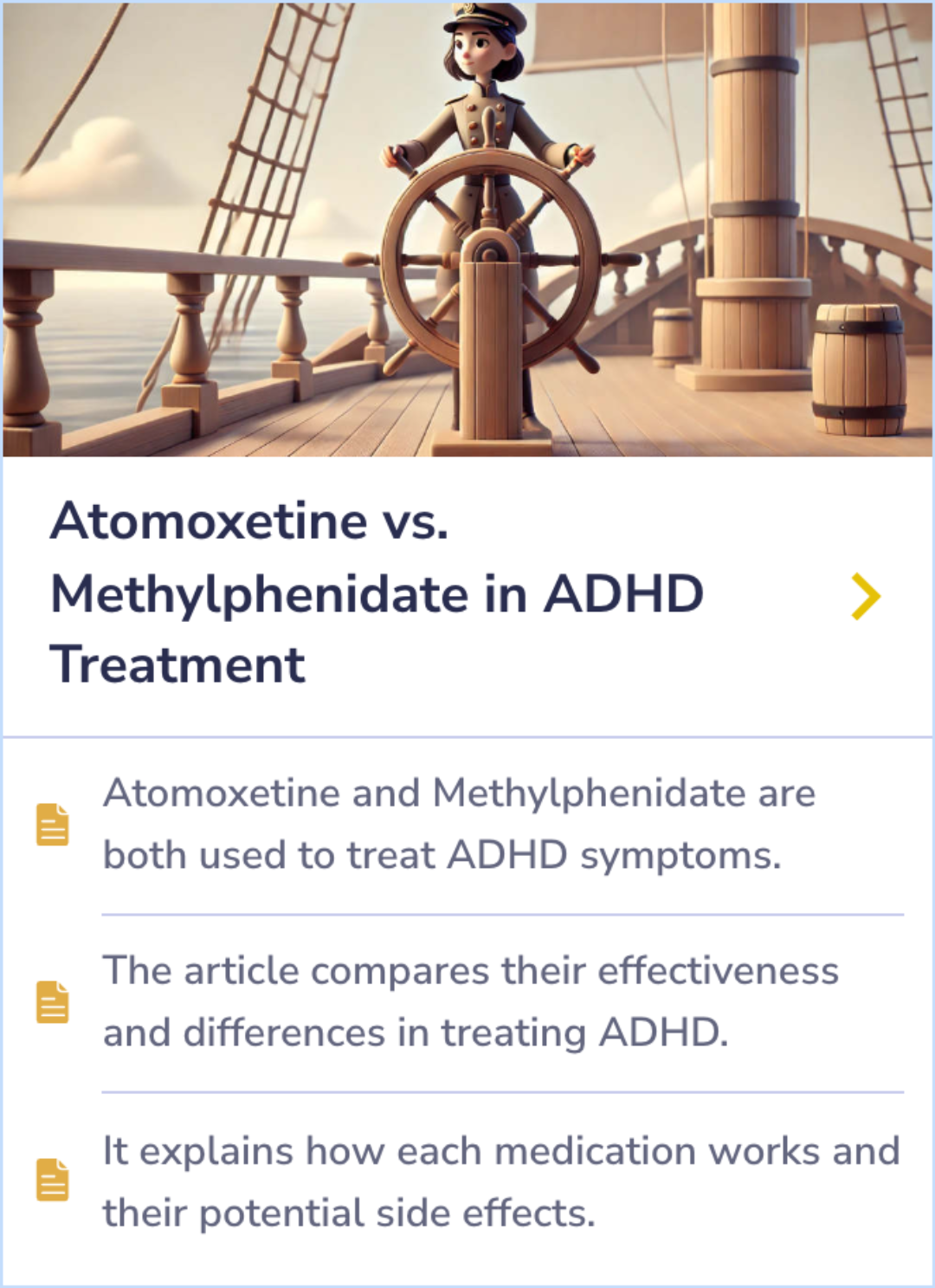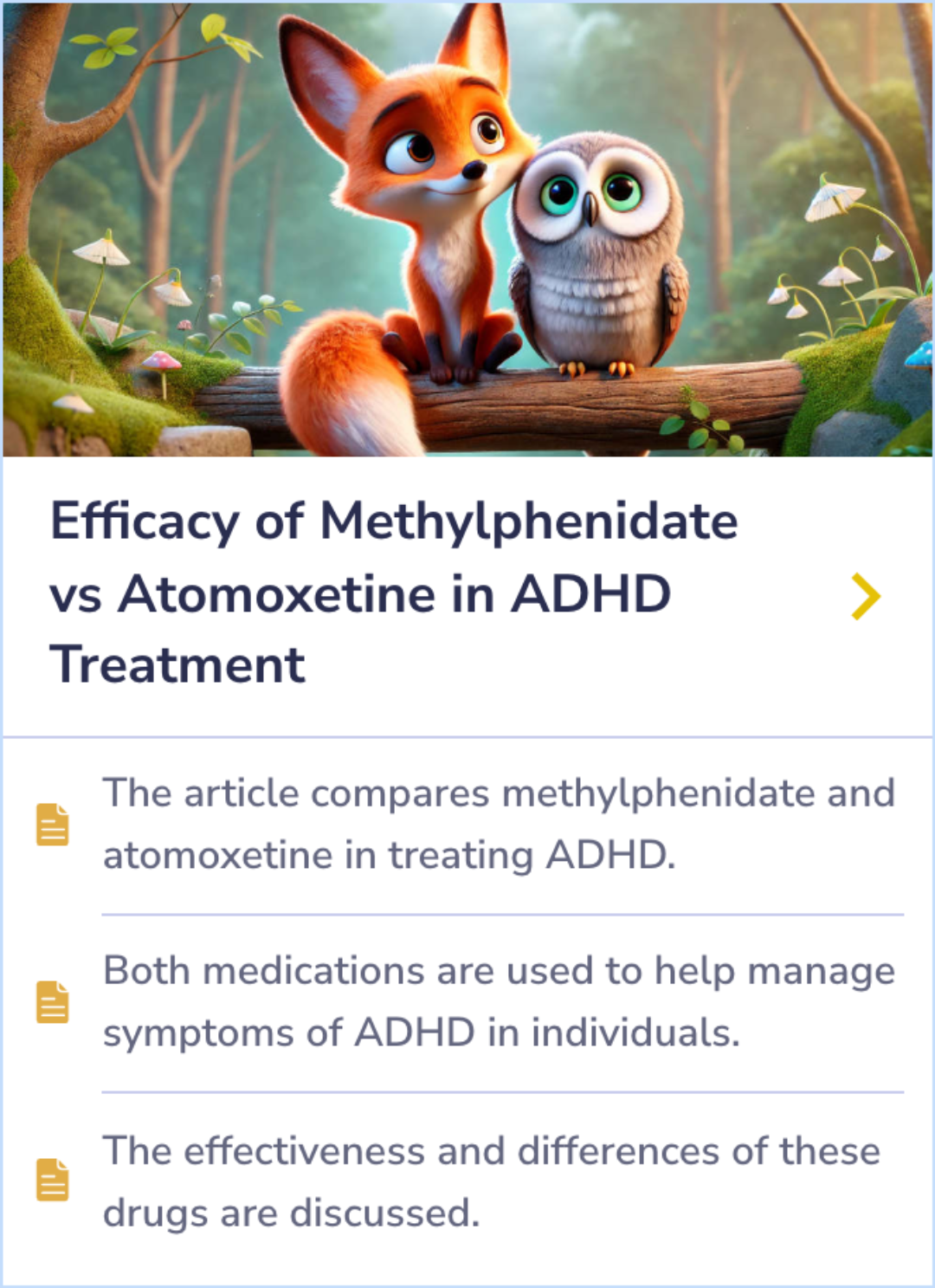Ritalin Paper Database
Visual Abstract
Hallucinations and Other Psychotic Symptoms Associated With the Use of Attention-Deficit/Hyperactivity Disorder Drugs in Children
Psychotic Symptoms from ADHD Medications
November 4, 2024
author
Andrew D. Mosholder, Kate Gelperin, Tarek A. Hammad, Kathleen Phelan, Rosemary Johann-Liang
journal
Pediatrics
Date Published
February 2009
Why link to a visual abstract?
What is a visual abstract?
Original
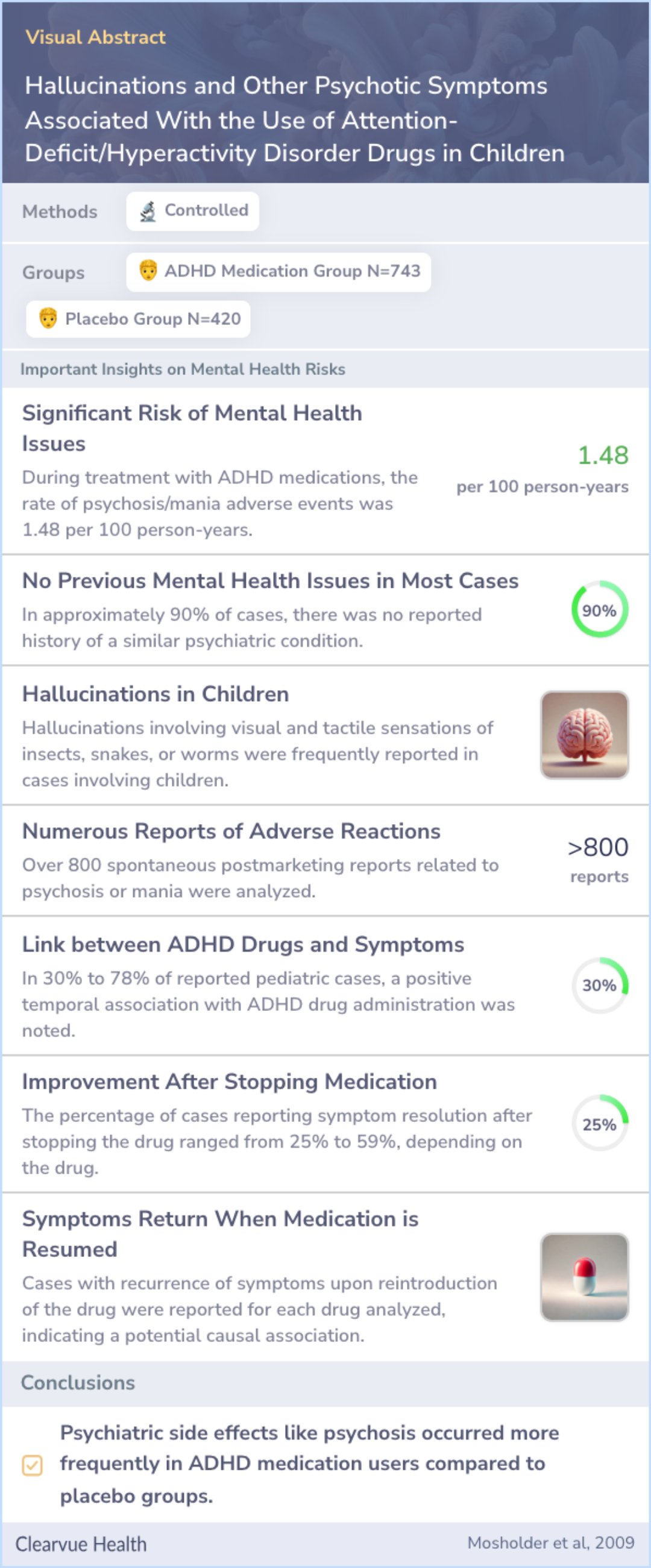
Study Summary
🔬
What They Studied
The study aimed to determine how often ADHD medications cause psychiatric reactions like psychosis and mania.
💡
What They Found
The researchers found that psychiatric side effects, particularly psychosis and mania, occurred at a higher rate in ADHD medication users compared to those on placebo.
📚
What This Means
These findings indicate that ADHD medications can lead to psychiatric side effects such as psychosis and mania, highlighting a need for patient and physician awareness regarding the potential risks.
Study Summary
Study Overview
This study aimed to investigate the potential psychiatric side effects associated with ADHD medications, particularly the emergence of symptoms like psychosis and mania. The findings suggest that some patients might experience severe reactions, prompting a need for careful monitoring. The review highlighted concerns raised by advisory committee members about psychiatric effects, aiming to inform clinicians about these risks in treatment plans.
The analysis included various reports of adverse events, focusing on the importance of reporting and understanding psychosis or mania-type symptoms resulting from these drugs. Patients and doctors need to recognize these potential drug reactions during treatment.
The analysis included various reports of adverse events, focusing on the importance of reporting and understanding psychosis or mania-type symptoms resulting from these drugs. Patients and doctors need to recognize these potential drug reactions during treatment.
Abstract: background
To gain a better understanding of the capacity of psychostimulant medications to induce adverse psychiatric reactions and determine the frequency of such reactions, we analyzed postmarketing surveillance data and clinical trial data for drugs, either...more

Understanding Adverse Effects
"Patients and physicians should be aware of the possibility that psychiatric symptoms consistent with psychosis or mania, when they arise in the course of drug treatment of ADHD, may represent adverse drug reactions."
Concern Raised
"In response to this concern, the FDA Office of Surveillance and Epidemiology conducted a comprehensive review of psychiatric adverse events reported during treatment with current and pending ADHD drugs for which clinical trial data had been submitted to the FDA."
FDA's Safety Profile Exploration
"This analysis provides an overview of the safety profiles for ADHD medications and highlights the importance of monitoring for psychiatric adverse events as an integral component of ADHD treatment."
Study Summary
Methods
To gather information, the US FDA asked drug manufacturers to search for instances of psychosis or mania in their clinical trial databases. These trials included individuals taking medications for ADHD.
The FDA also analyzed reports of these conditions from a safety database, which contained information from drug experiences post-release. This approach helped determine how often these side effects appear during treatment in both adults and children, ensuring a broad understanding.
The FDA also analyzed reports of these conditions from a safety database, which contained information from drug experiences post-release. This approach helped determine how often these side effects appear during treatment in both adults and children, ensuring a broad understanding.
Abstract: methods
The US Food and Drug Administration requested manufacturers of drugs approved for attention-deficit/hyperactivity disorder or with active clinical development programs for that indication to search their electronic clinical trial databases for cases ...more

Study Summary
Results
During clinical trials, 11 cases of psychosis or mania were reported over 743 person-years of treatment with these medications. No such cases occurred among those on placebo during 420 person-years. Analysis of reports postmarketing uncovered over 800 instances related to psychosis or mania.
Notably, about 90% of these cases lacked any prior psychiatric history. In children, hallucinations often involved seeing or feeling creatures like insects, snakes, or worms.
Notably, about 90% of these cases lacked any prior psychiatric history. In children, hallucinations often involved seeing or feeling creatures like insects, snakes, or worms.
Abstract: results
A total of 11 psychosis/mania adverse events occurred during 743 person-years of double-blind treatment with these drugs, and no comparable adverse events occurred in a total of 420 person-years of placebo exposure in the same trials. The rate per 10...more
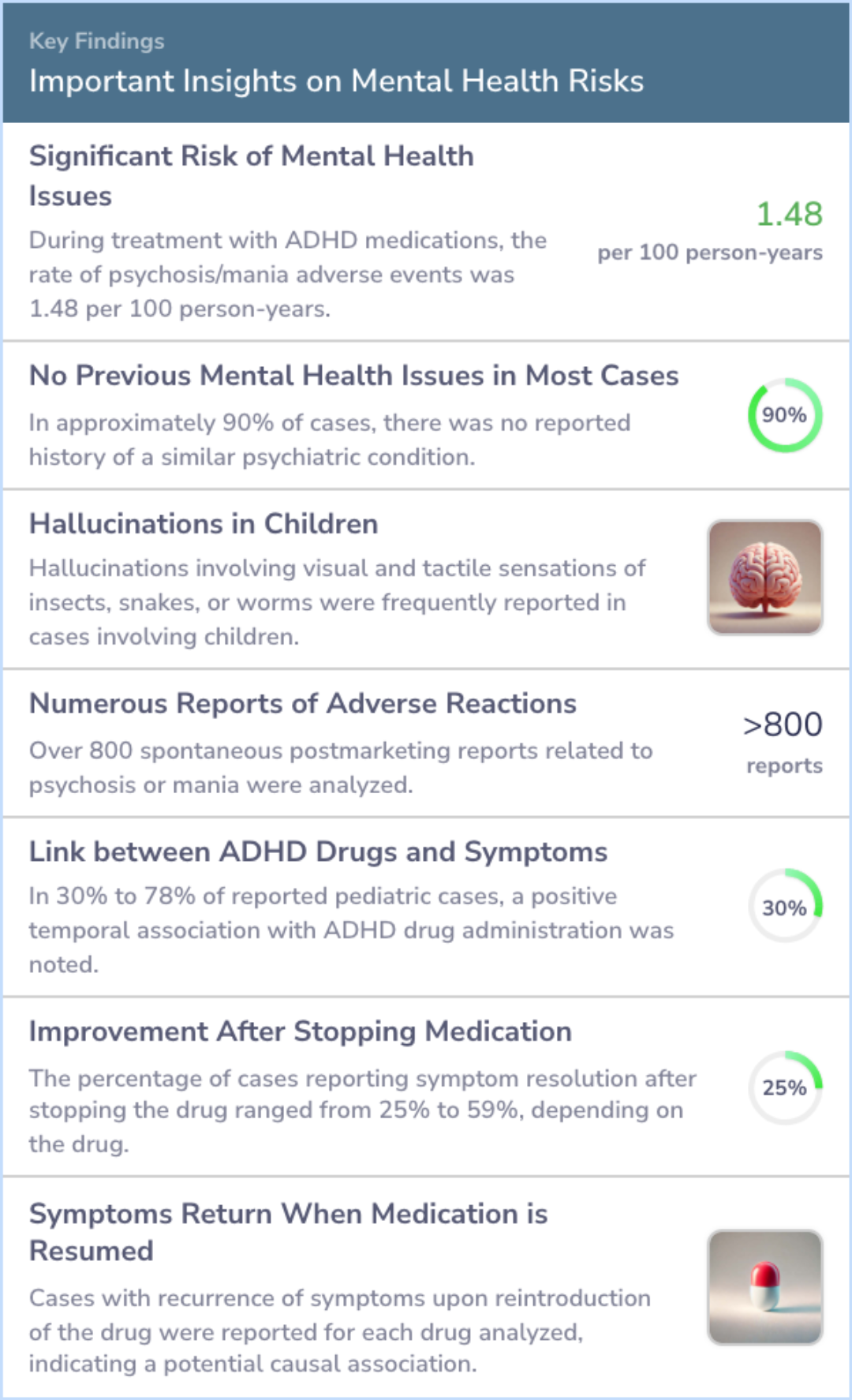
Study Summary
Conclusions
Awareness among patients and doctors is crucial, as psychosis or mania during ADHD treatment might be a side effect of the medication. While these reactions seem rare, recognizing them enables timely identification and addressal.
The findings underscore the importance of monitoring psychiatric symptoms in people taking ADHD medications, helping safeguard patient well-being.
The findings underscore the importance of monitoring psychiatric symptoms in people taking ADHD medications, helping safeguard patient well-being.
Abstract: conclusions
Patients and physicians should be aware that psychosis or mania arising during drug treatment of attention-deficit/hyperactivity disorder may represent adverse drug reactions.
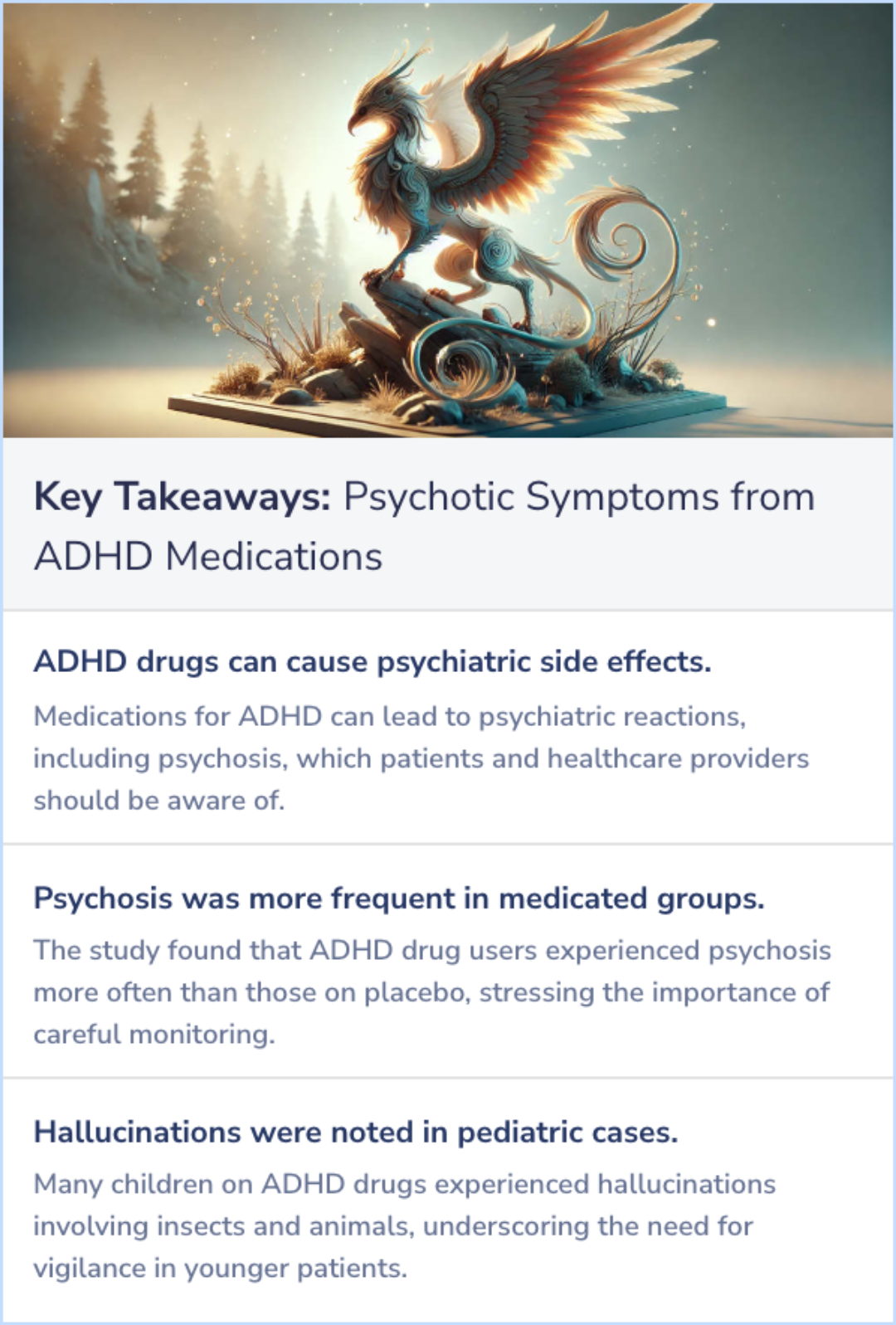
Background Information
Patient Guide
🧠
Psychiatric Risks of Methylphenidate
Methylphenidate can worsen psychosis and bipolar disorder or cause aggressive behavior in some patients.
📉
Stimulant-Induced Growth Concerns
Long-term use of ADHD drugs like methylphenidate may result in decreased growth in children, impacting height and weight.
⚠️
Adderall's Contraindications and Risks
Adderall is contraindicated for heart disease and carries the risk of worsening psychiatric symptoms.
🔄
CNS Stimulant Mechanism
ADHD medications like methylphenidate and Adderall increase norepinephrine and dopamine by blocking reuptake.
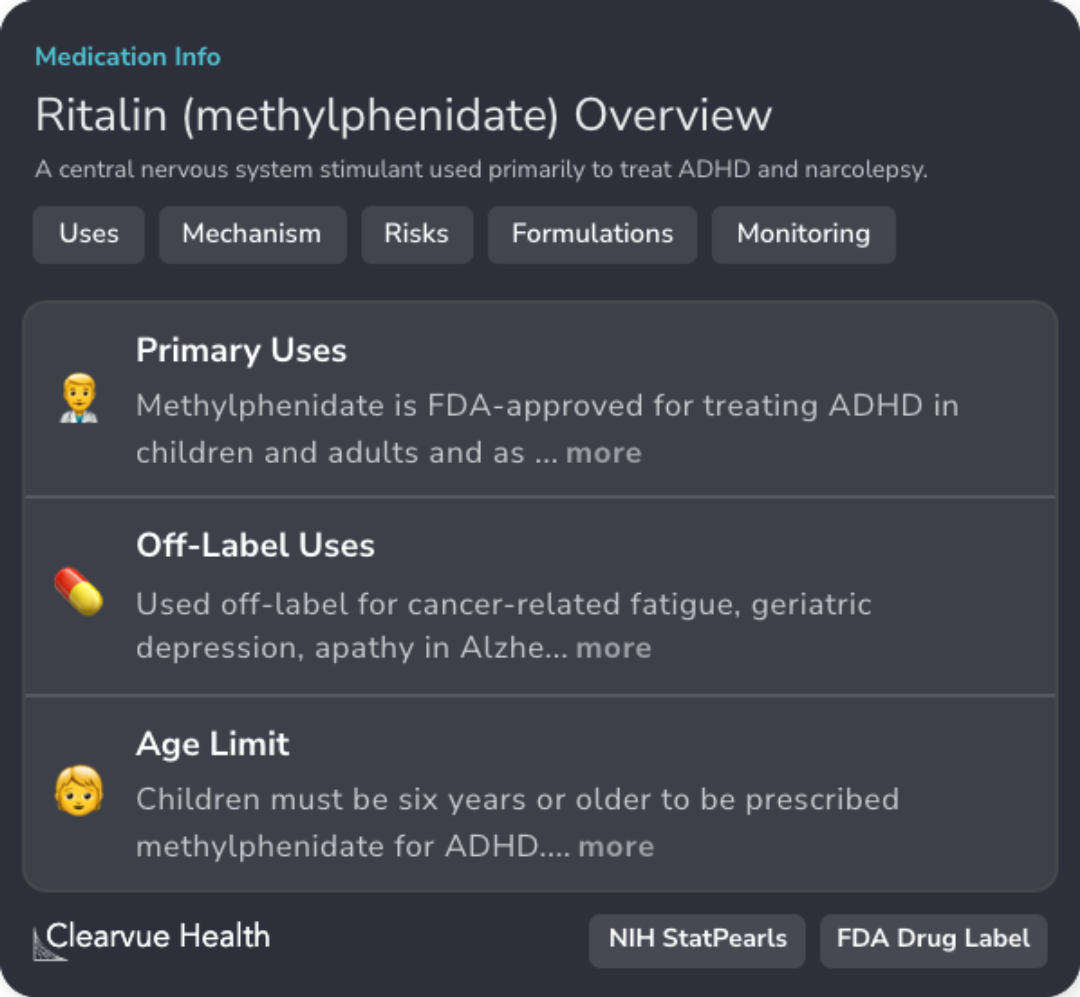
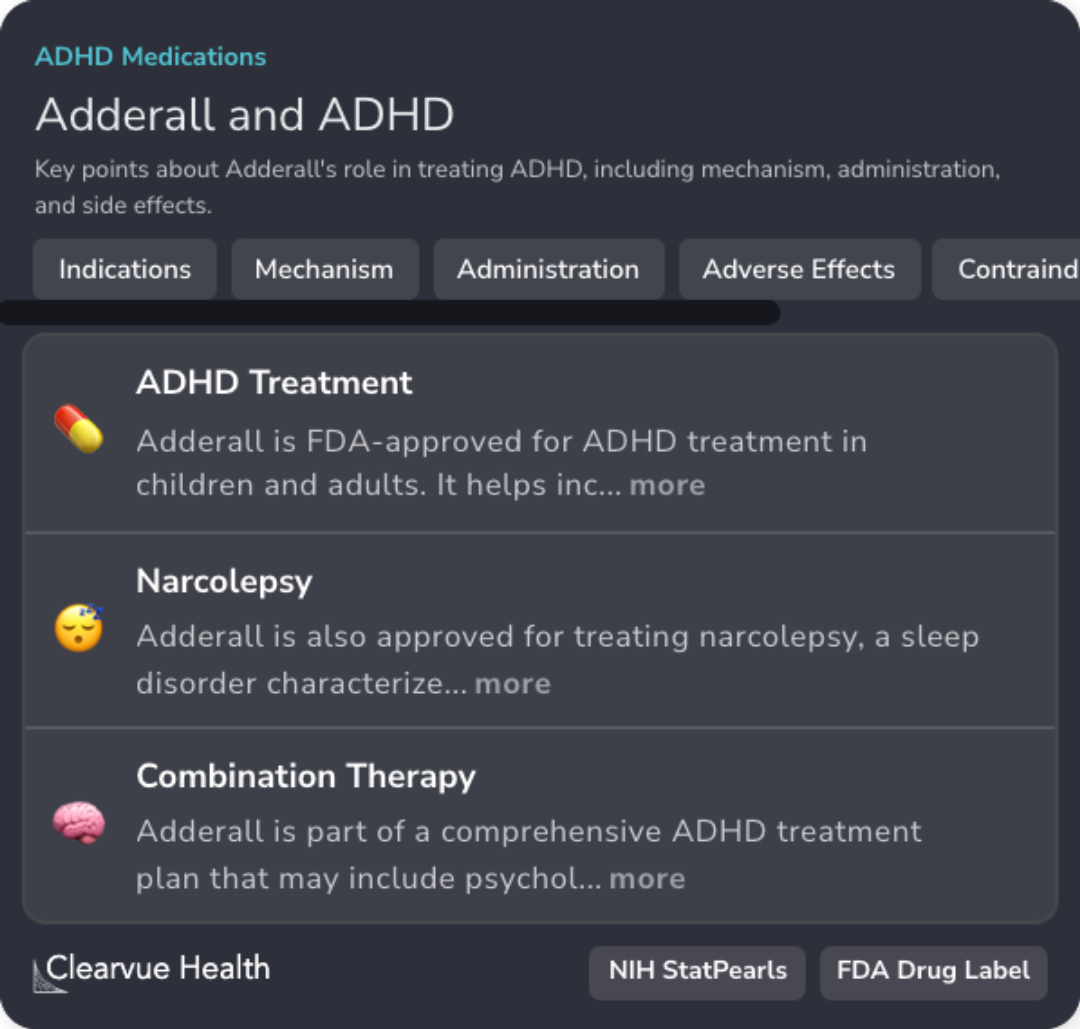
Professional Guide
Expert Opinion: Psychotic Symptoms from ADHD Medications
The abstract’s focus on psychiatric reactions aligns with the uncommon yet significant adverse effects of stimulants, which include hallucinations and psychotic symptoms.
Patients with preexisting psychotic disorders face the risk of exacerbated psychiatric symptoms when treated with stimulants.
Moreover, stimulants can induce psychotic or manic symptoms in children and adolescents without prior psychiatric history.
Thus, monitoring for aggression and hostility during ADHD treatment commencement becomes paramount to address potential adverse developments.
Patients with preexisting psychotic disorders face the risk of exacerbated psychiatric symptoms when treated with stimulants.
Moreover, stimulants can induce psychotic or manic symptoms in children and adolescents without prior psychiatric history.
Thus, monitoring for aggression and hostility during ADHD treatment commencement becomes paramount to address potential adverse developments.
Evidence Summary
How ADHD Medications Affect Heart Health
ADHD medications can impact heart health, with research showing changes in blood pressure and heart rate in some cases. These medications may elevate or lower these measures, depending on factors like dosage and individual response.
Research emphasizes the need for regular cardiovascular monitoring in ADHD patients, as these adjustments can help manage any potential risks tied to medication use.
Research emphasizes the need for regular cardiovascular monitoring in ADHD patients, as these adjustments can help manage any potential risks tied to medication use.
Evidence Summary
Comparing ADHD Treatments: Atomoxetine vs. Methylphenidate
Atomoxetine and Methylphenidate both target ADHD symptoms but work in unique ways. Atomoxetine affects norepinephrine, a brain chemical involved in attention, while Methylphenidate impacts dopamine, often leading to faster symptom relief.
This comparison highlights how these medications differ in their benefits and potential side effects, giving readers a clear view of their choices when managing ADHD symptoms.
Each medication offers distinct options, with Atomoxetine typically being non-stimulant and Methylphenidate a psychostimulant.
This comparison highlights how these medications differ in their benefits and potential side effects, giving readers a clear view of their choices when managing ADHD symptoms.
Each medication offers distinct options, with Atomoxetine typically being non-stimulant and Methylphenidate a psychostimulant.
Evidence Summary
Comparing ADHD Treatments: Methylphenidate vs. Atomoxetine
Methylphenidate and atomoxetine, both used to treat ADHD, are compared for their effectiveness in managing symptoms. While both medications target ADHD-related challenges, they work differently in the body, impacting symptom relief in unique ways.
This comparison highlights which drug may be more beneficial for specific needs in ADHD treatment, giving a clearer picture of their roles and effectiveness in improving daily functioning for individuals with ADHD.
This comparison highlights which drug may be more beneficial for specific needs in ADHD treatment, giving a clearer picture of their roles and effectiveness in improving daily functioning for individuals with ADHD.
